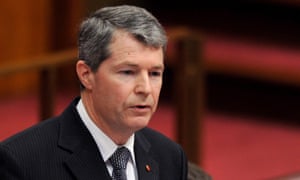A fiery and divisive Senate debate on Wednesday night about the central policy questions raised by the leaks of intelligence material by Edward Snowden repeatedly referred to a bipartisan committee report which has already recommended domestic intelligence oversight be strengthened.
Greens senator Scott Ludlam said the revelations by “the brave whistleblower Edward Snowden would appear to show that the government of the United States and its allies, including Australia, have been systematically spying on the whole world”.
Liberal senator David Fawcett took issue with Ludlam’s emphasis on privacy. “The human right for privacy? What about the human right to be safe? What about the human right to be able to live your life, whether it be in your family circumstances or in your workplace, secure in knowing that you are not about to be attacked by somebody who fundamentally disagrees with the basis of our community? What about the human right to live your life free of the fear that on holiday somewhere, whether it be in Australia or, as we have seen in the Bali bombings, your life or your wellbeing is going to be cut short by the actions of others?
“There is a balance and another side to every concept and, when it comes to human rights, I have to say the right to privacy, whilst important, must be held in balance, must be held in tension with the other rights that Australians expect and should deserve to have protected by their government,” Fawcett said.
“Security, safety and freedom from injury and fear are pretty powerful motivators to make sure that that balance is right.”
But, at least for domestic phone-tapping, data collection and spying, the parliamentary joint committee on intelligence and security had already considered the appropriate balance between necessary and legitimate intelligence gathering and an individual’s right to privacy.
In its May report it concluded, with the support of the Attorney General’s Department, the former government, the Law Council and the Australian federal police, that privacy safeguards should be strengthened.
The committee recommended “strengthening the safeguards and privacy protections under the lawful access to communications regime in the Telecommunications (Interception and Access) Act 1979, by specifying that the objectives of the act were both to ‘protect the privacy of communications’ and to “enable interception and access to communications in order to investigate serious crime and threats to national security”.
It also recommended that the Attorney General’s Department reconsider the “proportionality test” in the act, so an assessment of whether intelligence gathering was “proportionate” had to take into account “the privacy impacts of proposed investigative activity; public interest served by the proposed investigative activity, including the gravity of the conduct being investigated; and availability and effectiveness of less privacy intrusive investigative techniques.
“The proposal for a privacy objective drew broad support, from privacy advocates, private submitters, law enforcement and investigative agencies alike,” the committee said in its report.
The senators also differed strongly about the role of the media in reporting the Snowden leaks.
Ludlam pointed out that the “voices that shrieked loudest” in favour of press freedom when the former government proposed reforms to media laws “are now the ones lining up to kick the ABC and the media organisations that have put this material in the public domain the hardest”.
Greens senator Richard Di Natale praised Guardian Australia and the ABC for exposing potentially illegal activities.
“We know what happened about three weeks ago with the Guardian and the ABC, who broke the story about our government hacking the Indonesian president's phone and the phones of his wife and ministers. There were a number of commentators – and many members of this place – who challenged the legitimacy of those media outlets to raise what were very serious issues, not just serious moral issues but illegal activities under article 41 of the Vienna Convention on Diplomatic Relations, which says very clearly: ‘Without prejudice to their privileges and immunities, it is the duty of all persons enjoying such privileges and immunities to respect the laws and regulations of the receiving state. They also have a duty not to interfere in the internal affairs of that state.’ And yet here in this place people are challenging the legitimacy of the organisations who have reported this. Thankfully, we have newspapers like the Guardian which are now doing the job that our parliamentarians should be doing,” he said.
But Fawcett suggested the ABC, because it was taxpayer-funded, should not have published top secret documents and pointed out the jail terms provided for in the Crimes Act for disseminating classified information.
The former government did not respond to the report’s recommendations and a spokesman for the attorney general, George Brandis, said he was still considering them.

View all comments >